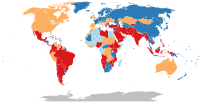
Photo from wikipedia
Background In High-income countries, many academic institutions are using E-learning during COVID 19 Pandemic. However, in limited-resource countries, like Sudan, shifting towards E-learning requires many adjustments to be made to… Click to show full abstract
Background In High-income countries, many academic institutions are using E-learning during COVID 19 Pandemic. However, in limited-resource countries, like Sudan, shifting towards E-learning requires many adjustments to be made to make sure the E-learning is held in a proper manner, as best as possible. This study was undertaken to assess medical students’ perception towards implementing E-learning during COVID 19 Pandemic and to highlight for E-learning implementation in Sudan as an example of a limited-resource setting. Methods A cross-sectional survey was conducted between 10 and 25 of May 2020 among the undergraduate medical students at the Faculty of Medicine, University of Gezira, Sudan. The study used self-administered online-based questionnaire. E-mail and social media platforms such as Facebook and WhatsApp were utilized to disseminate the questionnaire. Results The total numbers of 358 undergraduate medical students responded to the online survey questionnaire. The majority (87.7 %) of students agreed that the closure of the university is an essential decision to control the spread of the COVID-19 infection. Approximately two-thirds (64 %) of students perceived that E-learning is the best solution during COVID 19 lockdown. The level of medical students (Pre-clerkship and Clerkship) and place of residence had significant correlation ( p -value < 0.05) with medical students opinion regards starting the E-learning. Internet bandwidth and connectivity limitation, unfamiliarity with E-learning system, technical support limitation and time flexibility in case of technical problems during online exams, and lack of face-to-face interaction were the factors considered by medical students to be against the E-learning implementation. Conclusions Most medical students had a positive perception of E-learning. However, there are many challenges considered as an inhibitory factor for utilizing electronic technologies for medical education. We recommend that challenges of E-learning in our limited-resource setting should be systematically evaluated and that effective strategies should be developed to overcome their inhibitory effects.
Journal Title: BMC Medical Education
Year Published: 2021
Link to full text (if available)
Share on Social Media: Sign Up to like & get
recommendations!